[World] China must rethink its reliance on property sales to see real growth
Image source, Joyce Liu/BBC Image caption, Zibo's outdoor barbecues provide tasty, affordable, foodBy Stephen McDonellBBC China correspondentThe small eastern city of Zibo in Shandong province is experiencing an outdoor barbecue craze.People from all over China are coming here to taste its lamb skewers, which have become legendary via social media.It's quite a raucous experience and certainly not for the faint-hearted.The street is packed, you sit on little plastic chairs, drink beer and wrap chunks of meat with spring onion on the local flatbread while karaoke songs pump out in all directions.On the face of it, these crowds appear to show an economy rebounding strongly from the coronavirus emergency - but according to economists that's not the case.Rather, they say, this is an example of people choosing a cheap, tasty, option at a time of great pressure on household incomes.Image source, Joyce Liu/BBCImage caption, Zibo attracts people from all over China, who come for the lamb skewer
![[World] China must rethink its reliance on property sales to see real growth](https://www.9020blog.com/uploads/images/202307/image_750x_64a7f9c6e7ced.jpg)
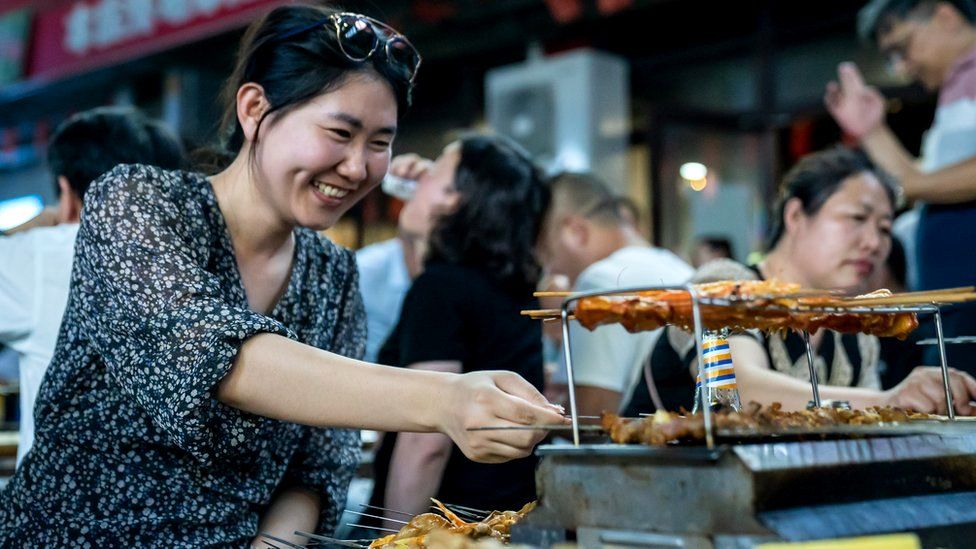
The small eastern city of Zibo in Shandong province is experiencing an outdoor barbecue craze.
People from all over China are coming here to taste its lamb skewers, which have become legendary via social media.
It's quite a raucous experience and certainly not for the faint-hearted.
The street is packed, you sit on little plastic chairs, drink beer and wrap chunks of meat with spring onion on the local flatbread while karaoke songs pump out in all directions.
On the face of it, these crowds appear to show an economy rebounding strongly from the coronavirus emergency - but according to economists that's not the case.
Rather, they say, this is an example of people choosing a cheap, tasty, option at a time of great pressure on household incomes.
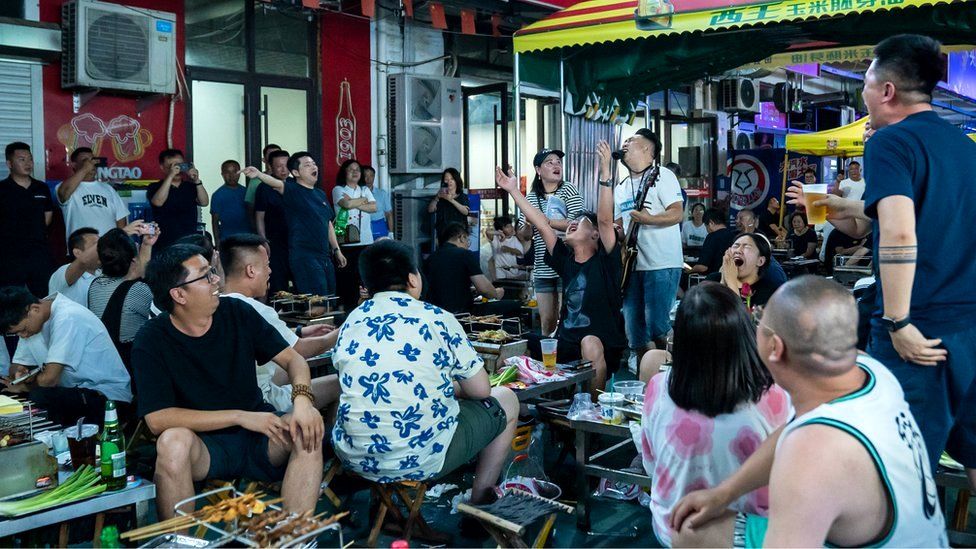
A man sitting with his shirt off tells us this is the perfect spot to enjoy a hot summer night with his family, and that this type of fun has a price tag to match the moment.
"This place is great for ordinary people," he says. "Recently, it's been hard to make money but still easy to spend it. After three years of Covid, the economy is only slowly recovering."
University graduates are being hit especially hard by China's economic doldrums, with youth unemployment hovering at or above 20%.
Some students are feeling nervous about their futures.
"Yes, I'm worried," says one woman who'll soon graduate. "There's a lot of competition. It's hard to find a job. All my classmates feel the same pressure."
For those who have jobs, a big reason for their reluctance to spend big is economic security.
They're concerned about the potential to join the ranks of the unemployed, and their household's largest single investment is, in many cases, no longer worth what they thought it would be.
The real estate sector is under great stress in China.
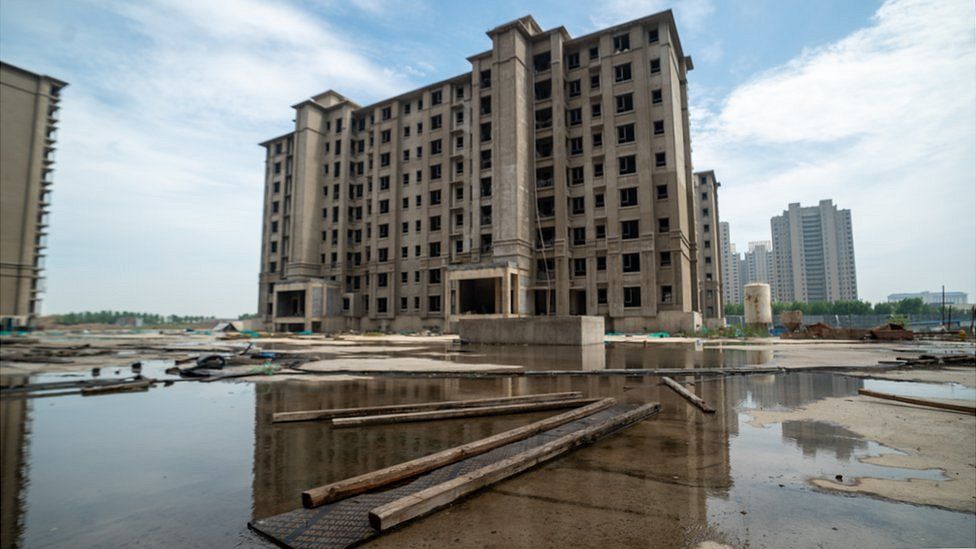
To see this first-hand, we drive a few hours east of Zibo to the outskirts of a much larger city, Qingdao.
Here, a property explosion hasn't matched real demand from buyers or renters, and the result has been huge housing estates built with very few residents in them.
A woman is selling cold noodles from a portable stand outside her housing complex where she has few neighbours.
A few years ago, her husband bought a flat here after moving to Qingdao to give their child a better start because they heard the schools would be good.
I ask her if she's worried about the value of her home collapsing.
"Of course I'm worried," she says. "But what can I do?"
Nearby a couple who are street cleaners have stopped for lunch. They point to the huge estate behind them and say that nobody lives there.
Across the road there is a small forest of concrete towers without paint, without windows and with window frames now looking the worse for wear, having been exposed to the elements.
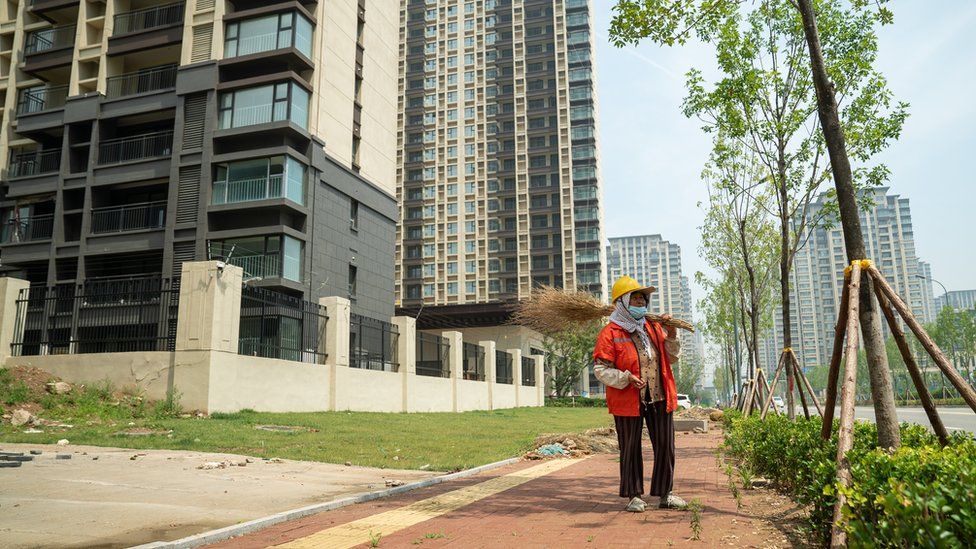
"Construction just stopped there one day last year," the man says.
According to his wife, the entire suburb is pretty dead. "There's nothing here. There's no petrol station. You have to go a long way for fuel. It's really not convenient to live here," she says.
There had been hope that this region would take off after the city hosted a major political meeting, the Shanghai Co-operation Organisation Summit, and China's leader Xi Jinping gave it his personal stamp of approval as a place to invest and do business, potentially hosting international expos and the like.
But the factories, start-ups and other companies that would supposedly employ those who bought property here have been few.
According to a local real estate agent, sales volumes have halved in the area in recent years.
"Prices are down because the market is saturated," she says. "Too many homes were built and it's hard to sell them."
We put up a drone to get a bird's eye view and it looks even worse than at ground level.
Entire new housing estates where work has stopped can be found in all directions. Those that are finished don't have much sign of life in them.
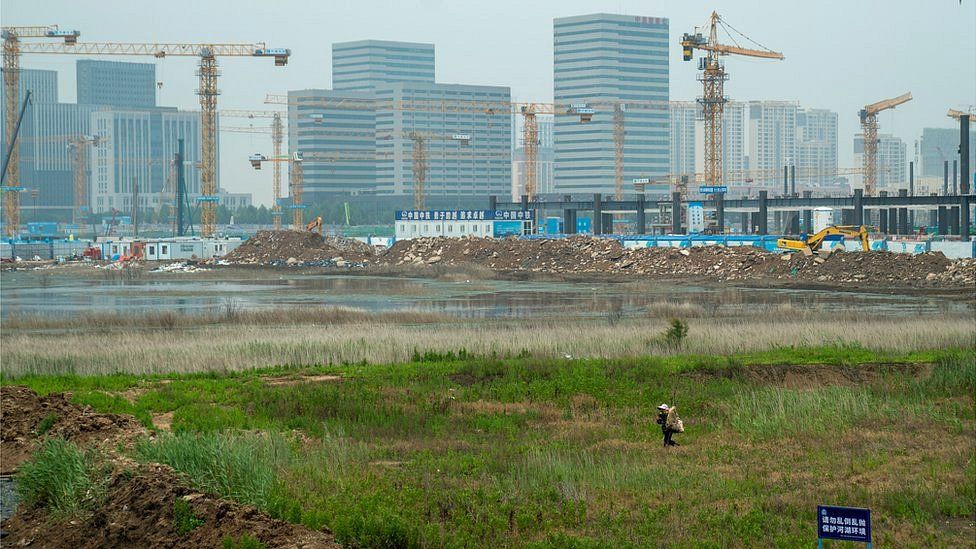
What's more, this supply and demand problem isn't unique to this area. It isn't even unique to this city. In province after province across China, evidence pointing to the danger of a property bubble is easy to find.
One reason for rampant real estate speculation in this country has been a lack of other options for investment. But the boom in real estate drove house prices out of the reach of ordinary families in many big cities. The government response was to cap the number of flats any person could buy.
It was a genuine attempt at an egalitarian reform, but pressure is now coming to reverse this. In Qingdao, such measures have already been eased, in an attempt to stimulate its stalled real estate market.
The challenge for Chinese policymakers is to find a way to wean this economy off such a heavy reliance on property sales to generate growth and business confidence.
Economists like Harry Murphy Cruise, from Moody's Analytics, think China is facing significant problems.
"China's economy is in desperate need of rebalancing," he tells the BBC from Australia. "It's had that massive period of growth over the last two or three decades from big infrastructure building, from a massive uptick in the property market that is actually not a sustainable growth driver going forward.
"Look around the world, developed economies need households as a key driver of economic growth, and that is just not what China has at the moment."
The Chinese government is considering ways to promote more spending by individuals and by businesses from interest rate cuts to cash handouts.
But the problem is sentiment.
People will feel more secure when there are more jobs. Businesses need to invest to create more jobs, but they are reluctant to do so while customers are so insecure.
As Harry Murphy Cruise puts it: "It's sort of like the chicken and the egg. You can't have that uptick in the economy unless you have business spending. They're not spending until they see that uptick. So, there's a stalemate that's really holding back a key portion of the economy."
Then there's the chance that all of this will bleed into global trade.
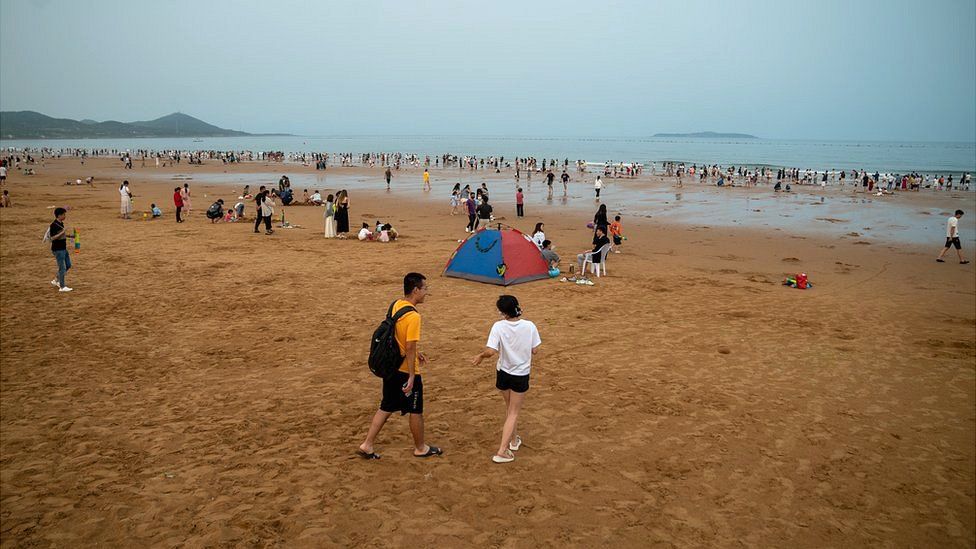
China is big. What happens to the world's second largest economy turns ripples into waves.
Reduced manufacturing here - off the back of weak international demand - has resulted in fewer exports, fewer Chinese-made goods available worldwide and less business activity in Asia's mega factory. Then the subsequent slower consumption in China means fewer imports of other countries' products.
The headache for the Chinese government is that it may have to choose whether to go for a short-term stimulus fix, which would delay the rebalancing it will eventually need to face, or whether to absorb more immediate pain and bring on the long-term solution more quickly.
Naturally, there are almost certainly those in Beijing's upper echelons of power considering some sort of middle path, starting with a milder boost to stabilise the economy, then considering the larger problems at hand.
Because they know that, once negative sentiment sets in, it can be hard to turn around.
Yet if you want to feel optimistic about Qingdao, and about life, you go to the beach. Tourism along its famous coastline does seem to be picking up.
There's laughter, sandcastle construction and everyone - whether they're a captain of industry or a truck driver - is enjoying the great embrace of the ocean.
Whether it matches reality or not, here you almost can't help but feel that, despite everything, the future still has good things in store.
Related Topics
What's Your Reaction?









![[World] The man who helped Orban and Netanyahu rise to power](https://www.9020blog.com/uploads/images/202307/image_650x433_64a2f7508f85a.jpg)



